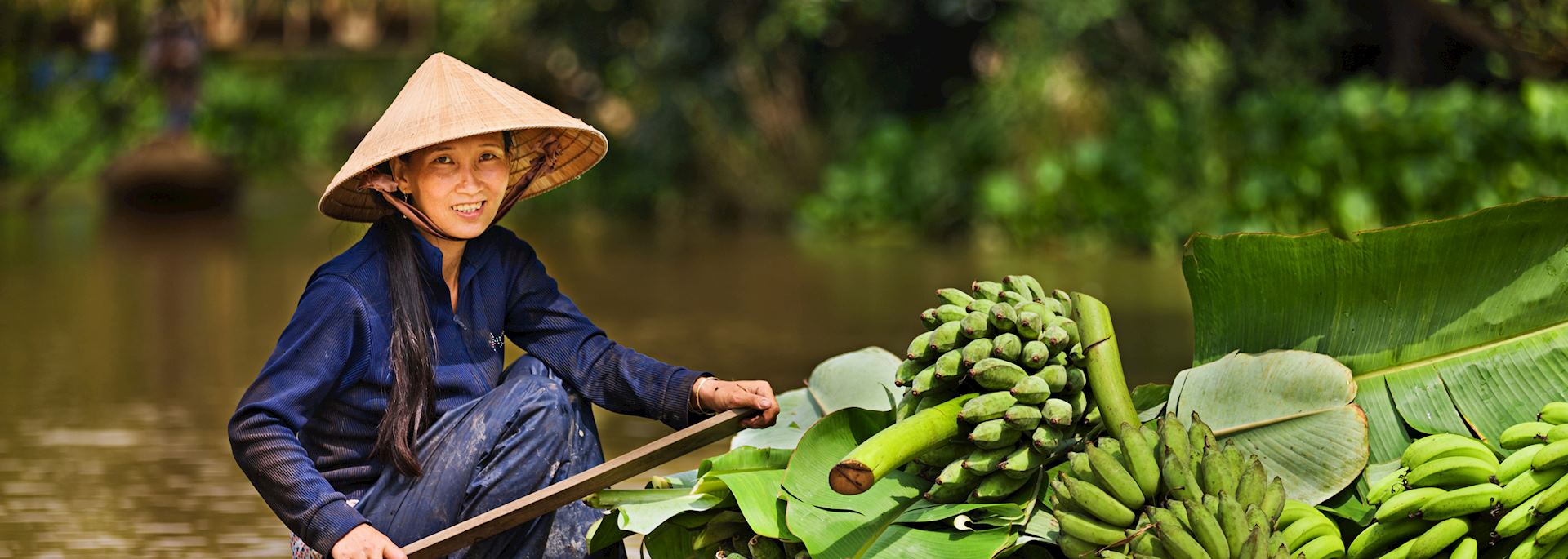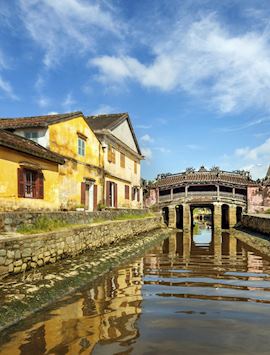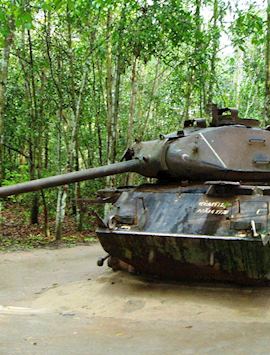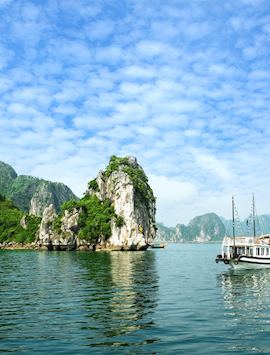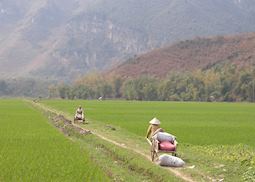The best time to visit Vietnam is between November and April. This is when the country experiences the least amount of rain.
Northern Vietnam
There are two distinct seasons. It’s hot from May to October, but the high humidity leads to significant rainfall.
The weather cools down from November to April and it’s much drier. December and January are the coldest months — temperatures drop as low as 10°C in most areas.
Central Vietnam
Central Vietnam’s summer season lasts from January until the end of August. The weather is hot and dry, with temperatures between 21°C and 35°C.
Conditions between September and December are much wetter, although temperatures remain balmy.
Southern Vietnam
Southern Vietnam’s hot and dry season starts in November and finishes at the end of April, with temperatures often reaching 30°C.
Rain falls between May and October, but the weather still remains warm, usually between 25°C and 32°C.
Month-by-month guide for traveling in Vietnam
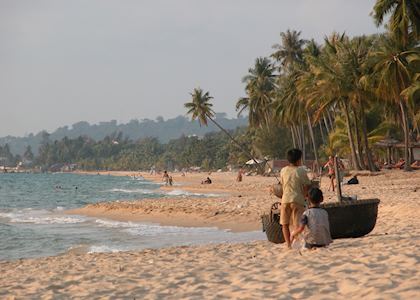
Visiting Vietnam in January
Dry and pleasant weather can be enjoyed throughout most of Vietnam at this time of year. River travel is at its peak, with cruises along the Mekong Delta and the Red River. For the best beach weather, we recommend heading to Phu Quoc for guaranteed sunshine, with highs of 30°C.
However, temperatures can drop dramatically in the northern regions in January, with mornings and late evenings feeling much cooler. This is especially the case for Sapa and Ha Giang, with temperatures dropping to a cold 5°C. The air can get quite hazy at this time of year, especially in Halong Bay, so you may not be guaranteed the best views.
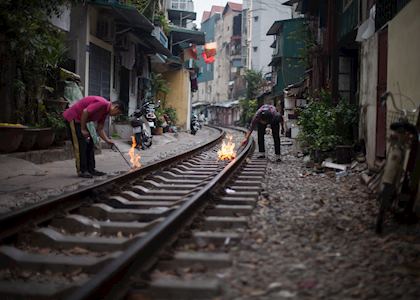
Visiting Vietnam in February
The cold mornings begin to disappear in the north and hot dry weather is expected throughout the majority of the country. Northern Vietnam remains an exception and feels much colder. One thing to note when traveling in February is that during TET (Vietnamese New Year) the majority of shops, museums and restaurants are closed for about a week, so this may impact your stay.
Events & Festivals
- The biggest festival of the year is Tet — Lunar New Year. It’s seen as a fresh start, so residents declutter their houses and throw firecrackers (or make other loud noises) to scare away evil spirits. You will see lots of red and yellow in the streets, because these colors are considered good luck. There are lots of free celebrations, with traditional shows and dragon dance performances. The date varies depending on the lunar calendar, but it normally takes place between late January and early February. Travel is busier at this time and many shops, restaurants and museums shut for the holiday.
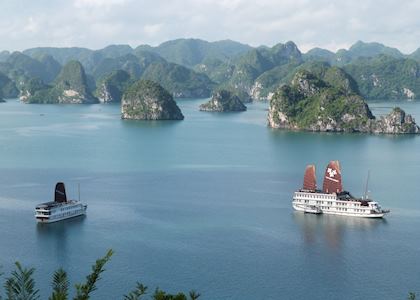
Visiting Vietnam in March
March is the peak season for traveling to Vietnam. Beachgoers have a better choice of destinations, with Mui Ne, Con Dao and Nha Trang all getting good weather. Hoi An is also a feasible beach destination toward the end of the month, with temperatures rising to 28°C.
March is the best time to visit Halong Bay, which should have clear blue skies without haze, and very little rain.
Events & Festivals
- Phu Giay Festival takes place at Phu Giay Temple, Nam Dinh province, in the third month of the lunar calendar, which is sometimes March. Participants pay tribute to Lieu Hanh, who is one of the four immortal gods in Vietnamese culture, and take part in traditional activities like folk singing.
- Thay Pagoda Festival commemorates the life of inventor Tu Dao Hanh with a procession and water puppetry performances. It takes place in either March or April each year.
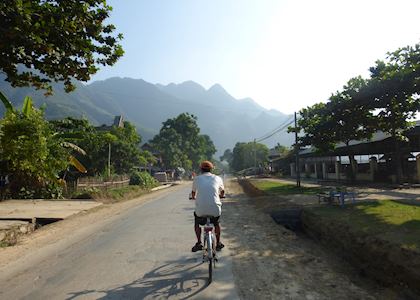
Visiting Vietnam in April
Great weather is expected almost everywhere in April, so you will notice more crowds.
The temperatures in northern Vietnam are in the high seventies by this time, so conditions are still good for those who want to hike around areas like Ha Giang and Sapa, where you can walk through paddy fields and visit the traditional villages of H’mong and Dao.
Beachgoers still have their pick, with the average temperature in central Vietnam around 28°C. In the south, temperatures are slightly higher, but there’s also a greater chance of rain.
Events & Festivals
- Thay Pagoda Festival commemorates the life of inventor Tu Dao Hanh with a procession and water puppetry performances. It takes place in either March or April each year.
- The Hung Festival is a national vacation that marks the birth of the first kings in Vietnam. People congregate at the Hung Temple to make offerings, then celebrate by enjoying traditional performances.
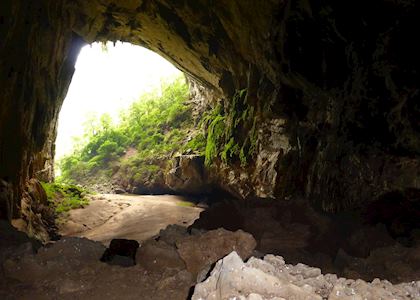
Visiting Vietnam in May
May offers a wonderful opportunity to miss the high season prices of April. It gets hot at this time of year, with temperatures reaching between 28°C and 30°C. Rain should hold off, but you may get the odd shower toward the end of the month in the northern and southern regions, normally in the middle of the afternoon.
Most of the central region stays nice and sunny, although there’s a chance of rainfall in the Central Highlands and Dalat.
Events & Festivals
- Chua Xu Festival marks the time when the stone statue of Chua Xu is bathed.
- International Labour Day (May 1) is a national holiday and also signifies the start of spring.
- The holy day Phat Dan celebrates the birth, enlightenment and death of Buddha.
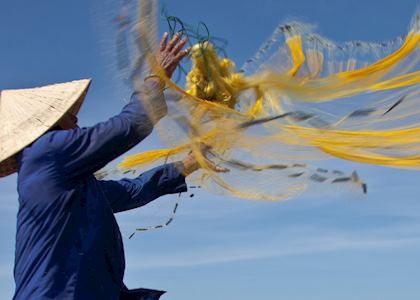
Visiting Vietnam in June
June is the perfect time to grab a low-season bargain before the European school vacations begin next month.
The best place to be in June is the central region, where the sun is out in full force. Very little rain is expected, and Hoi An serves as a lovely beach destination.
Temperatures in the north are in the early eighties, with regular rainfall and occasional storms meaning trekking is no longer an option, especially not in the mountains.
It rains daily in the south in June, but not for prolonged periods.
Events & Festivals
- The summer solstice, known as Tet Doan Ngo, is celebrated in Vietnam.
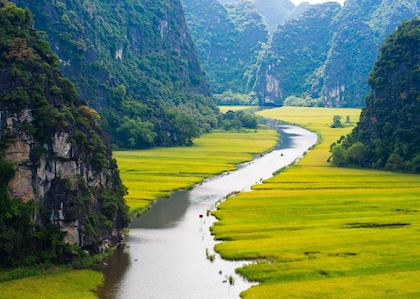
Visiting Vietnam in July
Central Vietnam is an ideal destination in July, with temperatures of 31°C, hours of sunshine and little rain. The beaches remain pleasant places to spend time on your trip, although the Central Highlands and Dalat are best avoided due to the higher volume of rain.
The rest of Vietnam will experience some showers, especially Hanoi and Halong Bay. But it’s still hot, with average temperatures of 30°C in the north and 29°C in the south.
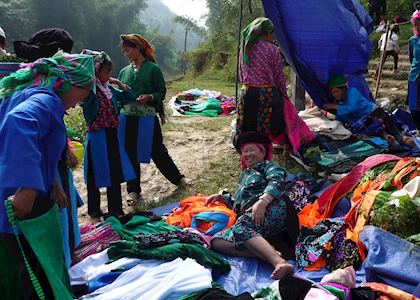
Visiting Vietnam in August
Central Vietnam is the best place to visit at this time of year, although the rest of the country is still worth visiting providing you don't mind a few showers. Temperatures are reliably warm no matter where you go.
While flights may be more expensive, hotels offer great promotions during Vietnam's low season. And if you go to the Con Dao coastline, you have the chance to see sea turtles hatching and making their way to the ocean.
Events & Festivals
- Tet Trung Nguyen is the Feast of the Wandering Souls and Hungry Ghosts. It’s viewed as the time to pardon condemned souls, thus releasing them from hell, and everyone is forgiven for their faults. Offerings of food are given to the homeless and animals such as birds are released.
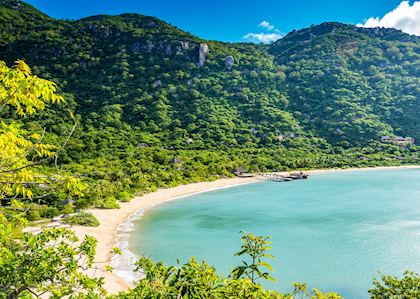
Visiting Vietnam in September
Catch the last of the sun on Vietnam’s central coast before the rains become more frequent toward the end of September. Temperatures start to drop (although they still reach the mid-eighties on average) and storms are far more likely to occur.
The north and south are usually very wet at this time of year, but the hotels are good value and the rains slowly start to ease off before the end of the month.
Events & Festivals
- Mid-Autumn Festival is on a different date every year, but always on the full moon between September and October. It’s a harvest festival that celebrates gathering, thanksgiving, and praying. Dragon and lion dances are performed, lanterns are lit, and children are gifted with sweets and toys.
- Vietnam National Day takes place on September 2. It’s a national holiday commemorating the Vietnam Declaration of Independence from France in 1945. This patriotic day is celebrated with a parade through the capital of Hanoi.
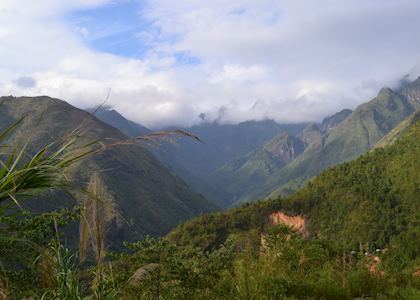
Visiting Vietnam in October
The sun comes back to the north of the country and this is a great time to trek in Sapa or venture off the beaten track in Ha Giang. While this isn't the best time for a beach vacation, Vietnam has so much else to offer and traveling in October means you beat the crowds.
Events & Festivals
- Mid-Autumn Festival is on a different date every year, but always on the full moon between September and October. It’s a harvest festival that celebrates gathering, thanksgiving, and praying. Dragon and lion dances are performed, lanterns are lit, and children are gifted with sweets and toys.
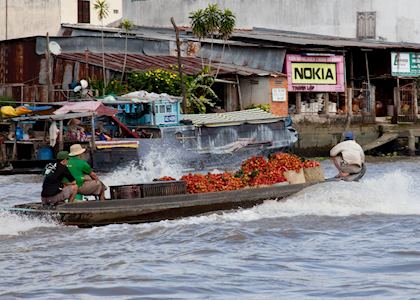
Visiting Vietnam in November
The high season begins again, with many travelers flocking to Vietnam before the colder winter months in the north. Most of the country will be hot and dry toward the end of November, except the central region, which will experience some heavy showers.
The north remains at a very pleasant 24°C, with a significant reduction in rainfall, while the south begins its summer season again. The drop in humidity means conditions are far more comfortable and the sun shines brightly all day.
Events & Festivals
- The Ooc Om Boc Festival, a boat racing festival in Soc Trang, can take place in November or December.
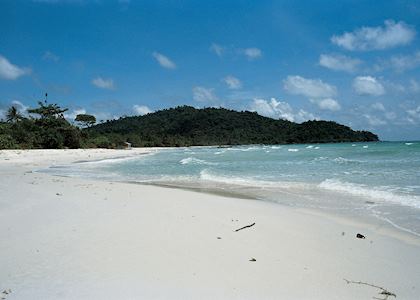
Visiting Vietnam in December
There is still a chance of rain in the central part of the country; however, the rest of Vietnam will be hot and dry. Beach season begins again on Phu Quoc. We advise traveling before the Christmas period as availability is few and far between.
Events & Festivals
- The Ooc Om Boc Festival, a boat racing festival in Soc Trang, can take place in November or December.
Vietnam Climate Guide
| Destination | Jan | Feb | Mar | Apr | May | Jun | Jul | Aug | Sep | Oct | Nov | Dec |
|---|---|---|---|---|---|---|---|---|---|---|---|---|
| Con Dao Islands | 28°C 15mm | 28°C 4mm | 30°C 9mm | 31°C 44mm | 31°C 223mm | 31°C 298mm | 30°C 264mm | 30°C 320mm | 30°C 327mm | 29°C 293mm | 29°C 183mm | 28°C 56mm |
| Halong Bay | 21°C 18mm | 20°C 36mm | 23°C 39mm | 27°C 71mm | 31°C 159mm | 32°C 203mm | 32°C 292mm | 32°C 323mm | 31°C 321mm | 29°C 90mm | 26°C 38mm | 22°C 18mm |
| Hanoi | 20°C 16mm | 21°C 30mm | 23°C 38mm | 28°C 87mm | 32°C 196mm | 33°C 241mm | 33°C 309mm | 32°C 334mm | 31°C 253mm | 29°C 117mm | 26°C 40mm | 22°C 20mm |
| Ho Chi Minh City | 32°C 13mm | 33°C 2mm | 34°C 11mm | 35°C 48mm | 33°C 214mm | 32°C 303mm | 31°C 291mm | 31°C 260mm | 31°C 316mm | 31°C 262mm | 31°C 112mm | 31°C 44mm |
| Hoi An | 25°C 97mm | 26°C 39mm | 28°C 30mm | 31°C 31mm | 33°C 54mm | 34°C 89mm | 34°C 72mm | 34°C 113mm | 31°C 327mm | 29°C 532mm | 27°C 388mm | 25°C 214mm |
| Hue | 24°C 164mm | 25°C 74mm | 27°C 92mm | 30°C 51mm | 33°C 106mm | 34°C 81mm | 34°C 81mm | 34°C 116mm | 31°C 364mm | 29°C 612mm | 26°C 625mm | 24°C 329mm |
| Mekong Delta | 30°C 11mm | 30°C 3mm | 31°C 10mm | 33°C 46mm | 31°C 171mm | 31°C 192mm | 31°C 218mm | 30°C 201mm | 30°C 263mm | 30°C 256mm | 31°C 146mm | 30°C 43mm |
| Nha Trang | 28°C 42mm | 29°C 15mm | 30°C 24mm | 32°C 43mm | 33°C 56mm | 33°C 45mm | 33°C 38mm | 33°C 49mm | 32°C 139mm | 30°C 292mm | 29°C 278mm | 28°C 157mm |
| Phu Quoc | 30°C 29mm | 30°C 18mm | 31°C 84mm | 32°C 142mm | 31°C 319mm | 31°C 405mm | 30°C 464mm | 30°C 620mm | 30°C 463mm | 30°C 303mm | 30°C 175mm | 30°C 55mm |
| Sapa & the Tonkinese Alps | 13°C 20mm | 15°C 53mm | 19°C 57mm | 22°C 139mm | 25°C 248mm | 24°C 290mm | 25°C 451mm | 25°C 406mm | 23°C 251mm | 21°C 120mm | 18°C 18mm | 16°C 6mm |
Why travel with Audley?
- 100% tailor-made tours
- Fully protected travel
- Established for over 25 years
- 98% of our clients would recommend us
Travel advice
Practical tips for traveling to Vietnam, from social protocols to guidance on money matters, with a link to the latest Government of Canada travel advice.

Request our brochure
Covering all seven continents, The World Your Way shows you how you can see the world with us. It features trip ideas from our specialists alongside hand-picked stays and experiences, and introduces our approach to creating meaningful travel experiences.
Trip ideas and travel guides for exploring Vietnam
-
![Japanese bridge, Hoi An]()
-
![US Tank, Cu Chi Tunnels, Saigon]()
-
![Halong Bay, Vietnam]()
-
What to do in Vietnam: our highlights guide ![Mai Chau, Vietnam]()
What to do in Vietnam: our highlights guide
What to do in Vietnam: our highlights guide
Read this guide

